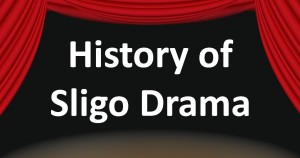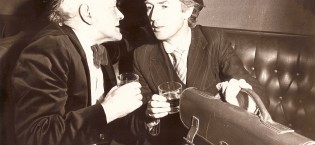Irish Drama Movement Under Fire
 Mr. Denis Franks, the well-known Shakespearean lecturer and writer, had some harsh things to say about the Irish drama movement when he lectured in Sligo last week on “Shakespeare without Tears”. He thought that the talk about the revival of the drama movement in Ireland was bogus and held the view that the standard of Irish drama was the lowest in Europe. He had this to say about drama groups: “In only too many cases it is a sense of exhibitionism and inflated ego that prompts so many groups to ‘put on a play'”. He added that it was a great pity that adjudicators were not a little more outspoken and if they said in public what they said privately the standards would be improved.
Mr. Denis Franks, the well-known Shakespearean lecturer and writer, had some harsh things to say about the Irish drama movement when he lectured in Sligo last week on “Shakespeare without Tears”. He thought that the talk about the revival of the drama movement in Ireland was bogus and held the view that the standard of Irish drama was the lowest in Europe. He had this to say about drama groups: “In only too many cases it is a sense of exhibitionism and inflated ego that prompts so many groups to ‘put on a play'”. He added that it was a great pity that adjudicators were not a little more outspoken and if they said in public what they said privately the standards would be improved.
No-one can deny that Mr. Franks was not outspoken and said publicly what he would say privately, but his remarks can hardly be taken as encouragement to those genuinely interested in the drama movement. Most people connected with amateur drama will not agree that “in too many cases” it is exhibitionism and inflated ego that prompts them to stage a play. They maintain that amateur groups stage plays because they are really interested in drama and the stage. Exhibitionism and ego may enter into it but not to the extremes claimed by Mr. Franks. With the exception of the few professional groups performing in this country, the remainder are amateurs who learn, rehearse and stage in their spare time and very often at their own expense. To attribute to them the two main motives of exhibitionism and inflated ego seems to be going a bit far.
On the question of outspoken adjudications, Mr. Franks’ statement gives the impression that adjudicators “soft pedal” their public criticisms rather than state outright what they really think. If this is correct, then the adjudicators are not doing the job for which they are paid. The adjudicators, professional and experienced actors and actresses, are brought to festivals to select the best groups and the best individual performers and at the same time to criticise constructively the standard of acting, production and choice of play. The groups who stage the plays want the opinion of an expert on their performances and to be told where the faults are and how they can be remedied. In most cases none of them would thank an adjudicator for telling them that they were good when, in fact, the opposite applied.
For amateur drama to survive and improve it must be guided and encouraged on the right lines by constructive correction and not blasted into obscurity by blistering criticism because it does not measure up to a professional’s standard of perfection.
from The Sligo Champion, April 9th, 1960
Tags: Drama in Sligo, History







